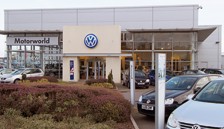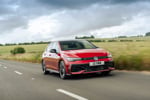Helping in hospices isn’t your average working day for a car salesman. But employees at Motorworld, Midcounties Co-operative's (Co-op) motor retail division, can spend 20-30 hours annually out of the office contributing to such good causes.
It underlines the company’s ethical beliefs – democracy, equality, openness and social responsibility.
Richard Shepherd, group general manager, wants staff to fully understand these values and has been spending time explaining them.
Last year, Midcounties Co-op as a whole contributed 22,365 hours to the local community and raised £150,000 for Dogs for the Disabled.
While there is a fundraising team, Shepherd encourages all his empl-oyees to get involved as much as possible.
Motorworld works differently to the average dealer group – staunchly opposed to the notion of plcs, it is owned by around 300,000 members. Anybody can buy a £1 share.
As a result, loyalty is high within members, which means guaranteed work in terms of aftersales. Members also receive points per pound for work done and are offered incentives such as half price MoTs and £99 services.
Midcounties Co-op's motor retail business started in 1984 with Volvo, Volkswagen, Audi and Mercedes- Benz franchises.
It also held a Toyota franchise for eight years from 1990.
In 1991, the company lost Mercedes-Benz which wanted exclusivity and in 2002, Block Exemption regulations saw Audi dropped.
Now, Motorworld has eight sites in Oxford, Swindon, Wantage, Newbury and Kidlington, two of which are multi-franchise, selling Volvo, Volkswagen, Mazda and Mitsubishi.
Its latest addition in October last year was a Ford franchise in Wantage.
A Volvo and Hyundai dealership in Wolverhampton closed at the end of last year due to poor sales. “It was the right thing to do strategically to get out of Wolverhampton,” said Shepherd.
All of its volume brands are selling relatively well at the moment, though Mitsubishi is struggling.
“The brand is very niche and quirky. There’s only the Colt in that popular sector and there are competitors that do similar models better,” said Shepherd.
Last year the dealer group accounted for around £69 million of Midcounties Co-op's overall £748 million turnover. While the group made around £16.9 million profit, Shepherd said Motorworld made a loss but declined to say how much. This year, turnover is expected to be about £60 million, with a 1% return on sales.
Year-to-date, new car sales are making about 2% margin while used car sales are making an impressive 11% profit.
Service margins are holding up well, said Shepherd, with 76% retained gross profit.
This is helped by member loyalty to its aftersales service. A database cleanse in November last year also means marketing is well-focused on the right people for differing services.
But the recession is still biting – Motorworld is down 12% on new car sales this year, compared to being down 6% in 2008.
Retail sales have been helped by responsible reactions from manufacturers, said Shepherd, with good finance offers and no new car stock pressure.
Motorworld reduced stock holding in January and February in anticipation of bad times and has been trying to get hold of stock ever since, he added.
While hesitant on the administrative side of the scrappage scheme, Shepherd saw it as a good move.
“It has generated footfall in our showrooms and has created a lot of excitement in the showrooms for sales executives.”
In one dealership there were 45 enquiries before the scheme started.
“It puts new car business in a better placed position. Many customers are simply going to think ‘I’m going to get £2,000 off my car’.“
But Shepherd added: “Between us and the franchises, we are actually substituting the £1,000.”
It will not get a bonus on cars sold through the scrappage scheme, but will instead receive a handling fee.
There is also a long lead time on many of the most popular cars in the scrappage scheme including VW Polo, Mazda2 and Volvo C30, which might cause problems, since a vehicle must be delivered within four months of the scrappage order being placed
In 2008, fleet accounted for around 65-68% of sales but this has lowered to around 55% this year. Shepherd thinks good retail offers have tipped the balance slightly.
Competition for the company comes mainly from the web. “We’re quite a sizeable group in Oxford.”
Shepherd sees little obvious threat in the immediate area.
Motorworld’s three-year vision is to be profitable with a 10% return on capital employed. Turnover would be in excess of £100 million with four to five more sites.
Shepherd said he would think about offering other services including motorcycles and bikes to build the business.
Any franchises that fitted well would also be considered. He said Toyota would be a good bet for the future and is keen to expand on the initial success of Ford at Motorworld.
Shepherd is keen to develop the business with an strong ethical underlying.
He is talking to staff about its beliefs of democracy, openness, social responsibility and equality because he wants people “to understand what and who they work for”.
As a co-operative business, social responsibility is key to Midcounties Co-op. Its core values include solidarity, caring for others and concern for the community.
To ensure it addressed this, Midcounties created a 'Steering Wheel' concept (see panel above) which aims to ensure financial goals are balanced with social, ethical and environmental aspirations.
“I am looking for engagement from employees on this,” said Shepherd. “It is a vital part of how we run our business at Motorworld.”















Login to comment
Comments
No comments have been made yet.